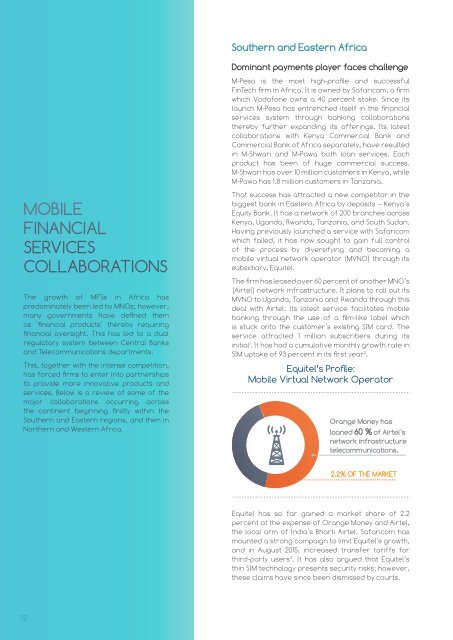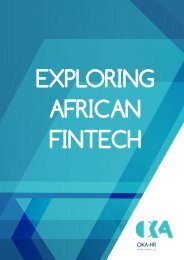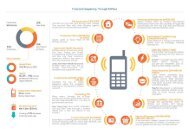FiA_2015
You also want an ePaper? Increase the reach of your titles
YUMPU automatically turns print PDFs into web optimized ePapers that Google loves.
Southern and Eastern Africa<br />
MOBILE<br />
FINANCIAL<br />
SERVICES<br />
COLLABORATIONS<br />
The growth of MFSs in Africa has<br />
predominately been led by MNOs; however,<br />
many governments have defined them<br />
as ‘financial products’ thereby requiring<br />
financial oversight. This has led to a dual<br />
regulatory system between Central Banks<br />
and Telecommunications departments.<br />
This, together with the intense competition,<br />
has forced firms to enter into partnerships<br />
to provide more innovative products and<br />
services. Below is a review of some of the<br />
major collaborations occurring across<br />
the continent beginning firstly within the<br />
Southern and Eastern regions, and then in<br />
Northern and Western Africa.<br />
Dominant payments player faces challenge<br />
M-Pesa is the most high-profile and successful<br />
FinTech firm in Africa. It is owned by Safaricom, a firm<br />
which Vodafone owns a 40 percent stake. Since its<br />
launch M-Pesa has entrenched itself in the financial<br />
services system through banking collaborations<br />
thereby further expanding its offerings. Its latest<br />
collaborations with Kenya Commercial Bank and<br />
Commercial Bank of Africa separately, have resulted<br />
in M-Shwari and M-Pawa both loan services. Each<br />
product has been of huge commercial success.<br />
M-Shwari has over 10 million customers in Kenya, while<br />
M-Pawa has 1.8 million customers in Tanzania.<br />
That success has attracted a new competitor in the<br />
biggest bank in Eastern Africa by deposits – Kenya’s<br />
Equity Bank. It has a network of 200 branches across<br />
Kenya, Uganda, Rwanda, Tanzania, and South Sudan.<br />
Having previously launched a service with Safaricom<br />
which failed, it has now sought to gain full control<br />
of the process by diversifying and becoming a<br />
mobile virtual network operator (MVNO) through its<br />
subsidiary, Equitel.<br />
The firm has leased over 60 percent of another MNO’s<br />
(Airtel) network infrastructure. It plans to roll out its<br />
MVNO to Uganda, Tanzania and Rwanda through this<br />
deal with Airtel. Its latest service facilitates mobile<br />
banking through the use of a film-like label which<br />
is stuck onto the customer’s existing SIM card. The<br />
service attracted 1 million subscribers during its<br />
initial 1 . It has had a cumulative monthly growth rate in<br />
SIM uptake of 93 percent in its first year 2 .<br />
Equitel’s Profile:<br />
Mobile Virtual Network Operator<br />
Orange Money has<br />
loaned 60 % of Airtel’s<br />
network infrastructure<br />
telecommunications.<br />
2.2% OF THE MARKET<br />
Equitel has so far gained a market share of 2.2<br />
percent at the expense of Orange Money and Airtel,<br />
the local arm of India’s Bharti Airtel. Safaricom has<br />
mounted a strong campaign to limit Equitel’s growth,<br />
and in August <strong>2015</strong>, increased transfer tariffs for<br />
third-party users 3 . It has also argued that Equitel’s<br />
thin SIM technology presents security risks; however,<br />
these claims have since been dismissed by courts.<br />
32





